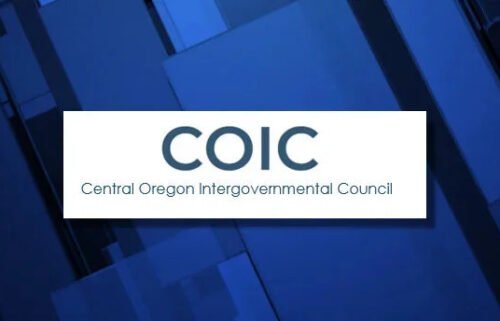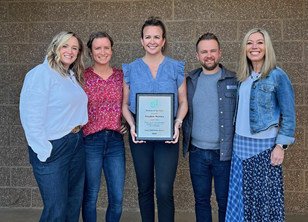February is final month Oregonians receive higher emergency food benefits

SALEM, Ore. (KTVZ) – Most Oregonians who receive Supplemental Nutrition Assistance Program (SNAP) benefits will receive their final emergency allotments in February.
In February, approximately 416,000 SNAP households will receive approximately $71 million in extra food benefits in addition to their regular SNAP benefits. This will be the final emergency allotment provided to Oregonians.
March will be the first month since April 2020 that most people on SNAP in Oregon will only receive their regular SNAP food benefits.
“We know that many rely on these additional emergency food benefits to get enough healthy food for themselves and their families,” said ODHS Director Fariborz Pakseresht. “As Oregon continues to be impacted by COVID-19 and the rising cost of food, we know that without these emergency food benefits some in Oregon may experience hardship and hunger.
"We encourage people who are concerned to start planning for this change today. Having a plan ahead of time will reduce the chance of experiencing an emergency or crisis later. There are food supports available to everyone in Oregon, you can find what is available in your community by contacting our partners at 211, the Oregon Food Bank or by visiting needfood.oregon.gov.”
"It's critical that Oregonians facing reduced support for groceries know that food remains available to all who need it," said Susannah Morgan, Oregon Food Bank CEO. "Across rural, urban and suburban communities, more than 1,400 free food markets, pantries and meal sites are moving mountains to make sure families have the resources we need to fill the gap. And everyone is welcome — regardless of race, gender, religion or immigration status."
“The end of the emergency allotments, as we all know, will be a very hard time for many folks and families, but we know there are great people at 211, ODHS and our partner agencies who stand ready to help and will lead with compassion to help the community navigate this change,” said Kerry Hoeschen, 211info emergency management director.
“At 211info, we are available 24/7 to provide information and referrals to agencies offering support for a wide variety of needs such as rent and utility payment support. This includes more than 1,000 food resources across Oregon and Southwest Washington like food pantries, farmers markets, community gardens, fresh food distribution and summer food programs for all Oregonians. To find out more about general resources and food programs, contact us! Language interpreters are available.”
Current SNAP households will receive emergency allotments on Feb. 11. Emergency allotments will be issued Feb. 28 or March 2 for households who did not receive benefits in the first monthly issuance.
Oregonians who receive SNAP are encouraged to prepare for this change in the amount of food benefits they receive. Having a plan ahead of time will reduce the chance of experiencing an emergency or crisis later.
Find out what your regular SNAP benefit amount is. Knowing your regular SNAP benefit can help you budget. You can check how much your regular benefits are by accessing your EBT account online at www.ebtEDGE.com or by logging into your ONE account at Benefits.oregon.gov.
Questions about your SNAP benefits can also be directed to the ONE Customer Service Center at 1-800-699-9075. The ONE Customer Service Center is open Monday through Friday from 7 a.m. to 6 p.m. Pacific Time.
Regular SNAP benefits are added to EBT cards between the first and the ninth day of the month.
Tell ODHS if your income has decreased. A decrease in your income may mean you qualify for more SNAP benefits.
Tell ODHS if there are more people in your household. An increase to the number of people in your household may increase your SNAP food benefits.
You can report changes to your income or household in many ways:
- Online at: Benefits.oregon.gov
- By mail at: ONE Customer Service Center, PO Box 14015, Salem, OR 97309
- By fax at: 503-378-5628
- By phone at: 1-800-699-9075 or TTY 711, Monday through Friday, from 7 a.m. to 6 p.m. Pacific Time.
Know what food supports are in your area. There are many different organizations providing food support in communities throughout Oregon:
- Find food resources in your community: needfood.oregon.gov
- Find a food pantry: foodfinder.oregonfoodbank.org
- Dial 2-1-1, or text your zip code to 898-211, www.211info.org
Remember that SNAP has changed since April 2020. In addition to the temporary emergency food benefits due to COVID-19, SNAP has experienced other permanent changes that will support people’s ability to get enough healthy food for themselves and their families.
On October 1, 2021, regular SNAP food benefits were permanently increased by an average of about $36 per person, per month.
In January 2022, Oregon increased the income eligibility limit for SNAP up to 200% of the federal poverty level. This means that an individual with up to $2,265 in income per month, or a family of three with up to $3,838 in income per month, are eligible to receive SNAP food benefits.
Why emergency food benefits are ending after February 2023
The federal government has approved emergency allotments every month since April 2020. The 2023 federal spending bill ended funding for emergency allotments. Due to this change, the federal government will no longer allow Oregon to issue emergency food benefits after February 2023.
This means that February 2023 is the final month that ODHS is allowed to provide these emergency food benefits to people receiving SNAP in Oregon.
These emergency food benefits have provided people in Oregon with $1.86 billion in additional money for food since April 2020.
More information about emergency allotments is available at https://www.oregon.gov/dhs/ASSISTANCE/FOOD-BENEFITS/Pages/About-SNAP.aspx.
Resources to help meet basic needs
- Find food resources in your community: needfood.oregon.gov
- Find a food pantry: foodfinder.oregonfoodbank.org
- Learn about government programs and community resources for older adults and people with disabilities: Aging and Disability Resource Connection of Oregon at 1-855-673-2372 or www.adrcoforegon.org.
- Dial 2-1-1, or text your zip code to 898-211, www.211info.org
- Find local resources and support by contacting your local Community Action Agency: www.caporegon.org/find-services/
- Oregon Department of Human Services COVID-19 help center
Administered by ODHS, SNAP is a federal program that provides food assistance to approximately 1 million eligible, families and individuals with low incomes in Oregon, including many older adults and people with disabilities. Oregonians in need can apply for benefits, including SNAP, child care, cash assistance and Medicaid. Learn more at https://govstatus.egov.com/or-dhs-benefits. For local resources in your area, such as food or shelter, please call 2-1-1 or reach out to the state’s Aging and Disability Resource Connection (ADRC) at 1-855-ORE-ADRC or 1-855-673-2372.



